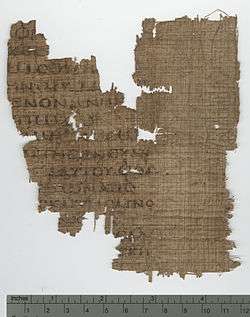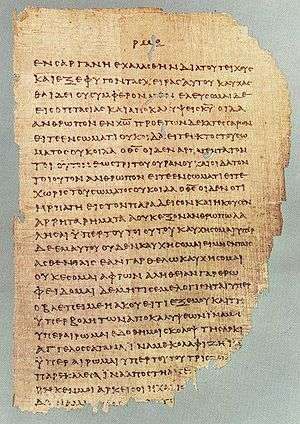2 Corinthians 11
| 2 Corinthians 11 | |
|---|---|
|
A folio of Papyrus 46 (written ca. AD 200), containing 2 Corinthians 11:33-12:9. This manuscript contains almost complete parts of the whole Pauline epistles. | |
| Book | Second Epistle to the Corinthians |
| Bible part | New Testament |
| Order in the Bible part | 8 |
| Category | Pauline epistles |
2 Corinthians 11 is the eleventh chapter of the Second Epistle to the Corinthians in the New Testament of the Christian Bible. It is authored by Paul the Apostle and Saint Timothy.[1][2]
Text
- The original text is written in Koine Greek.
- Some most ancient manuscripts containing this chapter are:
- Papyrus 46 (ca. AD 200)
- Codex Vaticanus (AD 325-350)
- Codex Sinaiticus (AD 330-360)
- Codex Alexandrinus (ca. AD 400-440)
- Codex Freerianus (ca. AD 450; extant: verses 1-2,9-10,20-21,28-29)
- Codex Claromontanus (ca. AD 550)
- Papyrus 124 (6th century; extant: verses 1-4, 6-9)
- Papyrus 34 (ca. AD 650; extant: verses 2,4,6-7)
- This chapter is divided into 33 verses.

Structure
This chapter can be grouped (with cross references to other parts of the Bible):
- 2 Corinthians 11:1-4 = Concern for Their Faithfulness
- 2 Corinthians 11:5-15 = Paul and False Apostles
- 2 Corinthians 11:16-21 = Reluctant Boasting
- 2 Corinthians 11:22-33 = Suffering for Christ
Verse 19
- For you put up with fools gladly, since you yourselves are wise![3]
- For ye suffer fools gladly, seeing ye yourselves are wise.[4]
Verse 24
- From the Jews five times I received forty stripes minus one.[5]
- Of the Jews five times received I forty stripes save one. (KJV)
We have no account in the Acts of the Apostles, or elsewhere, of any one of these five scourgings, which the apostle underwent from the Jews; but there is no doubt to be made of them. The number of stripes he received at each time agrees with the traditions and customs of the Jews. The original law for scourging a delinquent is in (Deuteronomy 25:2; Deuteronomy 25:3) where it is said, "forty stripes he may give him, and not exceed"; according to the nature of the case, forty stripes and no more might be inflicted, but fewer might suffice in some cases; the apostle's having but thirty nine at a time was not because the Jews thought his crime did not require full forty; or that they out of tenderness and compassion to him abated him one; but they proceeded with him to the utmost rigour of this law, according to their interpretation of it; for so runs their tradition,
“with how many stripes do they beat him? (a criminal,) it is answered, (txa rox Myebra) , "with forty save one"; as it is said, "with the number forty"; that is, which is next to forty; R. Judah says, with full forty is he to be beaten;”
but the decision is not according to R. Judah, as the commentators say;[6] and this is the general sense of their interpreters of that law,[7] and what they take to be the genuine meaning of it; so that the apostle was punished according to the extremity of it, in their account. This is a settled rule and point with them, (txa rox) (Myebra hrwt twqlm),[8] "that scourging according to the law is with forty stripes save one"; Maimonides[9] observes, that
“they did not add to forty, if a man was as strong and robust as Samson, but they lessen the number to a man that is weak; for if a weak man should be beaten with many stripes, he may die; wherefore the wise men say, that if he be never so robust, they scourge him but with "thirty nine";”
so that no mercy shown to Paul, or any regard had to his weak constitution, for it was the utmost they ever inflicted; besides, according to their manner of scourging, (See Gill on Matthew 10:17), they could not have given him another stroke, without giving him three stripes more, which would have made it forty two, and so have exceeded, which the law forbids; for they whipped with a scourge of three cords, and every stroke went for three; so that by thirteen strokes, thirty nine stripes were given, and if a fourteenth had been added, there would have been forty two stripes; agreeably to which they say,[10]
“when they condemn a delinquent to how many stripes he is able to receive, they do not count but by stripes that are fit to be trebled; if they reckon he is able to bear twenty, they do not say he is to be beaten with twenty one, so that they may be able to treble, but he is to be beaten with eighteen; they condemn to receive forty, and after he begins to be beaten, they see he is weak, and they say he cannot receive more than these nine or "twelve" with which he is beaten, lo, this is free; they condemn him to receive twelve, and after he is scourged they see he is strong and able to receive more, lo, he is free, and is not to be beaten any more upon the estimation:”
so that you see that, according to their own canons, they could if they would have mitigated this punishment of the apostle's; but such was their cruelty and malice, that they carried it to the utmost height they could.[11]
See also
- Aretas IV Philopatris
- Damascus
- Other related Bible parts: Deuteronomy 25, Acts 9, 2 Corinthians 2, 2 Corinthians 10, Galatians 1
References
- ↑ Halley, Henry H. Halley's Bible Handbook: an abbreviated Bible commentary. 23rd edition. Zondervan Publishing House. 1962.
- ↑ Holman Illustrated Bible Handbook. Holman Bible Publishers, Nashville, Tennessee. 2012.
- ↑ 2 Corinthians 11:19
- ↑ 2 Corinthians 11:19
- ↑ 2 Corinthians 11:24
- ↑ Maimon. & Bartenora in ib.
- ↑ Targum Jon. & Jarchi in Deut. xxv. 3. Zohar in Deut. fol. 119. 3. Joseph Antiqu. l. 4. c. 8. sect. 23. Moses Kotsensis Mitzvot Tora, pr. Affirm. 105.
- ↑ T. Hieros. Nazir, fol. 53. 1.
- ↑ Hilchot Sanhedrin, c. 17. 1.
- ↑ Ib. sect. 2. Misn. Maccot, c. 3. sect. 11.
- ↑ John Gill's Exposition of the Entire Bible, 2 Corinthians 11:24
